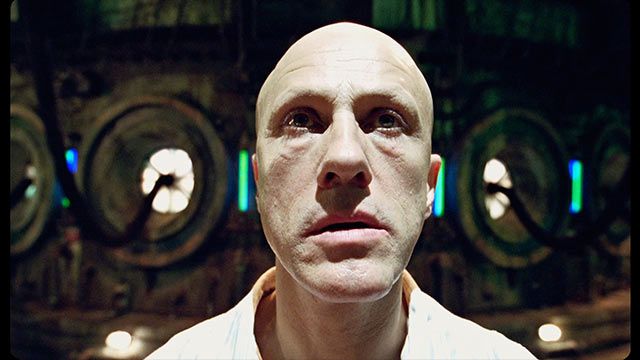
The Zero Theorem (2013) / Sci Fi-Fantasy
MPAA Rated: R for language and some sexuality/nudity
Running Time: 107 min.Cast: Christoph Waltz, Melanie Thierry, David Thewlis, Lucas Hedges, Tilda Swinton, Matt Damon
Cameo: Peter Stormare, Robin Williams
Director: Terry Gilliam
Screenplay: Pat Rushin
Review published September 17, 2014
 Set in a claustrophobic future, a bald and
quirky Christoph Waltz (Epic,
Django Unchained) stars as Qohen Leth, a computer whiz
extraordinaire whose job duties shift, thanks to Management (Damon,
The Monuments Men), to try to
discover the meaning of life, or lack thereof, through his coding (aka
'entity crunching') of a highly sophisticated computer running a
program designed to come up with "the zero theorem", to prove once and
for all that all of life equals nothing in the end. Qohen has
been obsessed with finding that meaning on his own, expecting a
callback from an entity that he feels was about to divulge life's
purpose only for their conversation to abruptly get cut off, and he
need to work from home in order to be there for that phone call when
it happens again. With the help of his old supervisor Joby
(Thewlis, The Fifth Estate),
Management's genius son Bob (Hedges, Labor
Day), and a call girl named Bainsley (Thierry, Babylon
A.D.), Qohen is
either going to solve life's ultimate riddle or crack up trying like
so many who've tried to do so before him.
Set in a claustrophobic future, a bald and
quirky Christoph Waltz (Epic,
Django Unchained) stars as Qohen Leth, a computer whiz
extraordinaire whose job duties shift, thanks to Management (Damon,
The Monuments Men), to try to
discover the meaning of life, or lack thereof, through his coding (aka
'entity crunching') of a highly sophisticated computer running a
program designed to come up with "the zero theorem", to prove once and
for all that all of life equals nothing in the end. Qohen has
been obsessed with finding that meaning on his own, expecting a
callback from an entity that he feels was about to divulge life's
purpose only for their conversation to abruptly get cut off, and he
need to work from home in order to be there for that phone call when
it happens again. With the help of his old supervisor Joby
(Thewlis, The Fifth Estate),
Management's genius son Bob (Hedges, Labor
Day), and a call girl named Bainsley (Thierry, Babylon
A.D.), Qohen is
either going to solve life's ultimate riddle or crack up trying like
so many who've tried to do so before him.